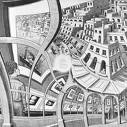Disintegration

Disintegration is the father of integration, as well as its first born child.
Things fall apart—or seem to—then integrate again, then fall apart again. Different each time, and quite predictably so.
Stability is a myth; integration an active verb. Neither integration nor disintegration come with haunches to squat upon.
Living an integrative life depends upon punctuation. And you provide this. If you insert a hard stop period or a savoring semi-colon following an experience of integration, you will construct your history our of integrating experiences. Do the same with disintegration, and your history will be one damned thing after another or the same damned thing over and over again.
Because we believe in the Myth of Stability, we learn early to vilify our father and first-born child: disintegration. The Myth of Stability focuses our attention upon our self, as if we were somehow independent, viable, and not in inevitable relation with others. When things fall apart, we notice what's missing, and what's often missing is someone else.
Because we live in relation and people are unpredictable, disintegration is inevitable. Fortunately, disintegration is the father and first-born child of integration, and each integration becomes a father in his own right, siring his own child. Sandwiched between are those golden, glowing moments, creative, inspiring, integrating.
Appreciate the bitter flavors. Life is sweet, but also salty and savory, bitter and umami, sometimes tasteless. Altogether, tasty. This meal integrates disintegration.


